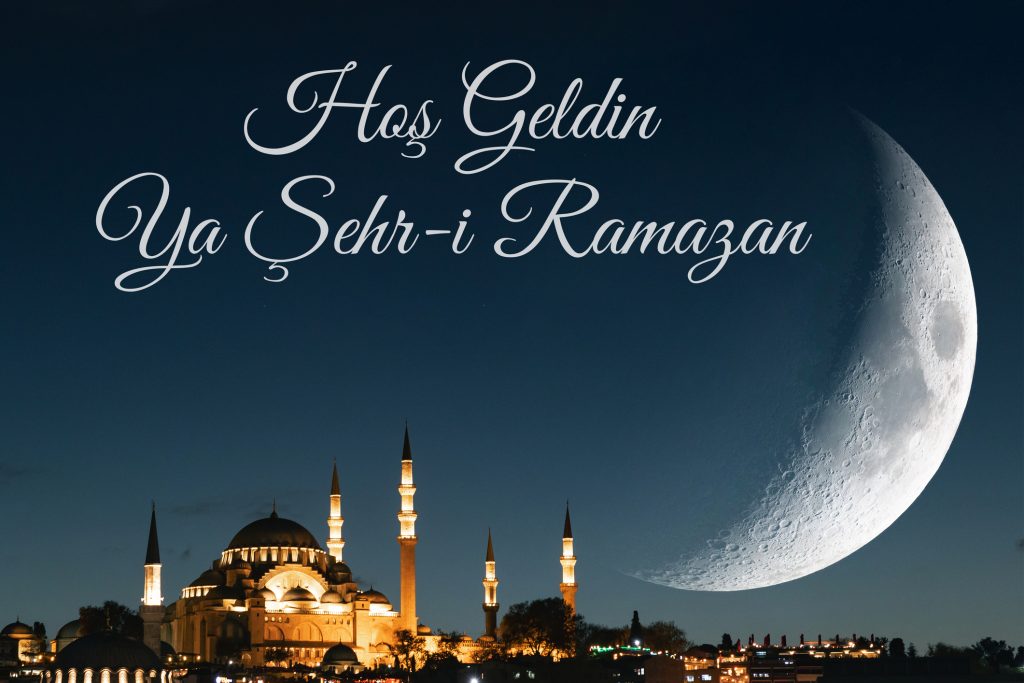Monday marked the first full day of fasting for Muslims around the world as part of the month of Ramadan, or Ramazan in Turkish. For thirty consecutive days, all healthy Muslims will refrain from eating or drinking anything from sunrise to sunset.
Why is this month so important for the nearly 2 billion followers of Islam? Here are seven facts about what Ramazan means to Muslims.
1. A time for spiritual reflection and reawakening
Ramazan is when the Holy Kur’an was first revealed to the Prophet Muhammed. Like the Prophet, each year Muslims use this time for their own spiritual reawakening, a form of quiet introspection as well as an opportunity to rekindle their devotional relationship with God.
As part of their personal reflections, Muslims will read the Kur’an, pray more than usual, and perform acts of kindness, including making charitable donations known as Zakat.
Often Muslim almsgiving is used to help feed the poor and those living through conflict, but donations can be used to support the upkeep and repairs of a mosque, and to fund other charitable organisations for Muslims.
2. The dates for Ramazan change every year
The Islamic calendar, or Hijri, does not follow the Gregorian Calendar of the West, but instead follows the cycles of the moon. Each new month begins when the new moon is sighted.
The 12 lunar cycles equate to 354 or 355 days, which is why each year the start and end dates of the month of Ramazan are around 11 days earlier than the previous year.
Some Muslim-majority countries, such as Turkiye, go with scientific predictions of the moon cycle, but many Muslims prefer the traditional approach, waiting for clerics in Saudi Arabia to have physical sight of the new moon to determine the exact start and end dates of Ramazan and other Islamic festivals.
3. Fasting is one of the Five Pillars of Islam
There are five obligations on all Muslim, which are commonly known as the Five Pillars of Islam. The first pillar is taking an oath or shahada (or Kelime-i şehadet in Turkish), where a person states that “There is no god but God, and Muhammed is the Messenger of God.”
The second pillar is to pray five times a day (at dawn, noon, mid-afternoon, sunset, and after dark) facing Mecca. The third pillar is to fast (oruç tutmak in Turkish) during the month of Ramazan.
The fourth pillar is to go on a pilgrimage, or hajj (hac in Turkish) to the holy site of Mecca at least one in a person’s lifetime, and the fifth is to give alms, or zakat (zekat in Turkish).
4. Why Muslims fast
Fasting during the month of Ramazan is one of the Five Pillars of Islam; it requires both physical and spiritual discipline. One of the reasons Muslims fast is to reflect on those who must make do with much less food and drink all year round.
It also forms part of a general month of abstinence, where Muslims try to break with other bad habits they may have acquired, and instead focus on improving their lives to become better human beings. By turning away from worldly pleasures for this month, Muslims can elevate their spiritual essence.
Fasting during daylight hours can also stimulate a healthier approach to life as a whole. Muslims will often slow down the pace of everyday living, while being more careful with their diet, trying to consume wholesome foods with higher nutritional value that are designed to get them through the day, while dispensing with the more processed, unhealthy foods and snacks that our bodies often crave for, but do little by way of health benefits.
Muslims will also try to break their fast together with others. It makes the iftar, or post-fast meal, a more joyful, communal experience. Some also try to come together for a pre-dawn meal, known as sahur but given the early morning timings, this meal is often one people eat at home.
Of course, fasting isn’t peculiar to Islam. This practice is common in other major religions, although when and how fasting is carried out varies with each faith.
5. Prayers at the mosque
Mosques will be busy every day of the week instead of just Fridays, as Muslims try to attend prayers each night after breaking their fast to perform terâvih namazı, or Tarawih in Arabic.
This voluntary prayer, only performed during Ramazan, are accompanied by readings from the Kur’an, allowing worshipers the chance to expand and deepen their knowledge of Islam.
Terâvih namazı, which can also be performed at home, can occur any time at night after the obligatory Yatsı namazı (Isha prayer), but before Vitir namazı (Witr prayer) – the final prayer of the night. Terâvih namazı requires a minimum of eight, but is more usually 20 rekât.
A rekât is a unit of prayer in Islam, which comprises of standing and reciting an extract from the Kur’an, bowing, standing again, then prostrating. The Terâvih namazı is prayed in sets of two rekât. People can take a break after each set of four rekât.
6. The Night of Power
For Turks, it is Kadir Gecesi, for other Muslims it is Laylatul Qadr, also referred to as the Night of Power, or the Night of Decree. Occurring during the last ten nights of Ramazan, it is one of the most important and sacred nights in the Islamic calendar, “better than a thousand months” (97:3, Kur’an).
The month of Ramazan is holy for Muslims because it is during this period that the Islamic holy book the Kur’an was first revealed to humankind. Kadir Gecesi is dedicated to the actual night that the Kur’an was first revealed to Prophet Muhammed. Those initial verses, known as Surah al Alaq can be found in the 96th chapter of the Kur’an.
The Night of Power is an opportunity for Muslims to earn even more rewards for their prayers and good deeds, which is why those final ten days are crucial for being in a state of worship, reflection and meditation.
7. Eid al-Fitr, or Ramazan Bayramı
Eid translates as “the festival of breaking the fast”, and Eid al-Fitr, or Ramazan Bayramı in Turkish, marks the end of the month-long fast of Ramazan. Having undergone a month of abstinence and devotion to Allah, Muslims around the world spend three joyful days with their loved ones.
This year’s Ramazan Bayramı is estimated to fall on or near 10 April 2024 – the sighting of the moon differs from country to country.
Religious and cultural traditions come together during this period as those who have been fasting give thanks for being able to complete the full-term.
The first day of Bayram, however, always starts with early morning prayers at the mosque and due to limited space and big demand, most mosques will hold several prayer sittings.
Afterwards, Muslims will go to spend time with their loved ones. People tend to visit their nearest and dearest family, often their elders, on the first day of Bayram. On the second and third days, visits are paid or received from extended family and friends. They will also pay their respects to those that have passed by visiting their graves either on the eve of Eid (Arife) or on the first day.
For this festive period, they will dress in their best clothes and, like the annual Christian celebration of Christmas, Eid is an occasion to give gifts to one another.
After a month of eating healthily, Bayram is also a time to eat lots of rich food, including sweet desserts such as baklava and ekmek kadayıfı (a bread pudding with clotted cream) that was avoided during Ramazan. It’s one of the reasons Turks also call this holiday Şeker Bayramı (Sweet Eid).
Many Turks will also use the occasion to party. Ramazan is a time of refrain and even those not particularly religious treat the month like Lent, forgoing pastimes such as drinking, gambling and partying. Bayram is a chance to let loose again.
Main image, top, by dagasansener/iStock





